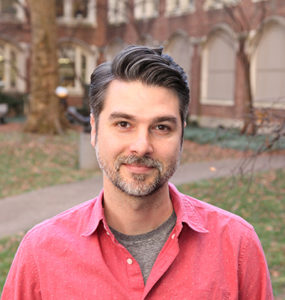By Aaron Conley

Kristopher Burkewitz, assistant professor of cell and developmental biology, has been awarded $100,000 from the American Federation for Aging Research and the Glenn Foundation for Medical Research to research the biological aging process. Burkewitz was one of 10 recipients nationally of this early-career award.
The project
Burkewitz’s project will work to understand the sequence of events in which cells lose their youthful inner architectures. “Cells are crowded places, and the ways in which different organelles touch and communicate with each other are critical for maintaining healthy cells,” Burkewitz said. “Based on evidence that certain organelles adopt aberrant forms with age, we think that structural changes at the subcellular level are contributing to the aging process.”
To understand the sequence, Burkewitz needs to generate a much more complete picture of how the organelles and their interactions change with time. His lab has teamed with James Fitzpatrick and his group at Washington University in St. Louis to capture 3D snapshots of young and old complete cells and their organelles at a nanometer resolution.
“AFAR and the Glenn Foundation for Medical Research play a huge role in helping junior researchers establish a new idea,” Burkewitz said. “This higher-risk work we wanted to perform didn’t entirely fit into the standard formula of some other major funding bodies. In this way I think AFAR really serves as an engine for innovation in the field.”
Why is this important?
Prevalence of diseases such as cancer, heart disease, arthritis, cataracts, osteoporosis, diabetes, hypertension and neurodegenerative diseases greatly increases with age. Approximately two-thirds of deaths globally and 90 percent of deaths in industrialized nations are due to age-related causes. Understanding how aging impacts the formation of disease at a cellular level is of the utmost importance to creating preventive and therapeutic interventions.
Using some of the newest concepts in cell biology to investigate aging, Burkewitz’s research investigates the very mechanisms that cause loss of function in cells. “With a better understanding of how organelles are structurally and functionally linked to one another, we can intervene therapeutically to protect cellular integrity during aging,” he said.
The next decades hold promise for aging research and interventions. “There has recently been a push to translate more of the findings of the past 40 years toward impacting human health, which is really exciting and I’m sure will continue,” Burkewitz said. “I also think there is more to be learned about how we can ameliorate age-related diseases through basic research. The molecular genetics of aging is a young field! The best interventions for age-onset declines will be precisely targeted to the molecules, pathways and/or processes that drive disease pathogenesis late in life.”
Go deeper
Burkewitz will also be a panelist at the “Living Longer: The Science of Longevity” virtual event. The event will be Nov. 30 at 11 a.m. CT. More information and registration can be found here.